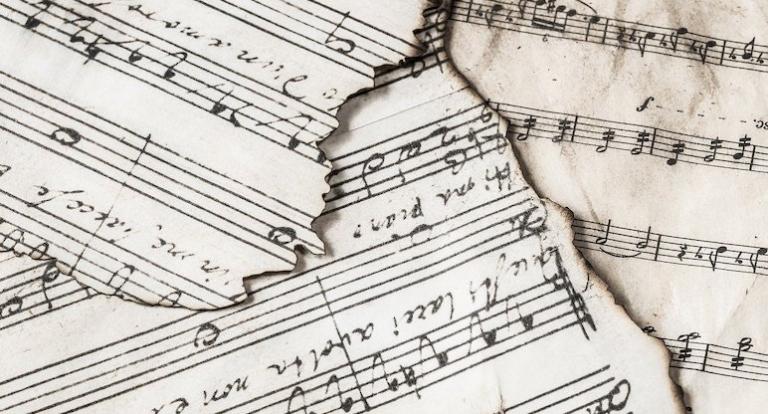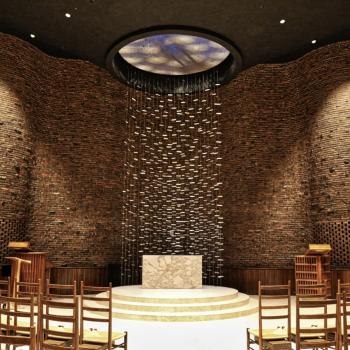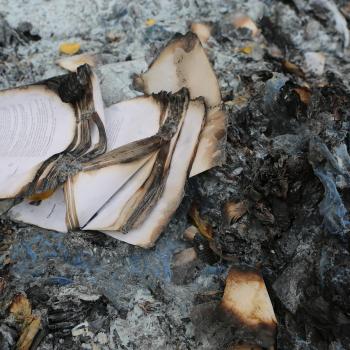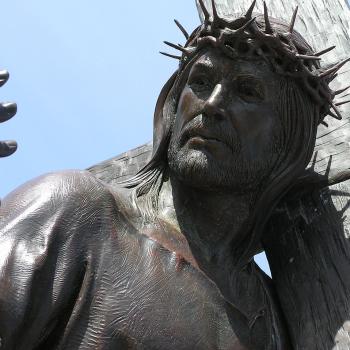Handel’s masterwork isn’t just great music. It can also help us grow in faith this Advent season – but only if we know how to listen to it.
Advent is hard. It’s a time in which we are called to ponder the darkness of the world, waiting in sober yet joyful expectation for the coming of Jesus.
But that’s really difficult when your neighbor’s house is flashing red and green like the runway at LaGuardia. Our whole culture skips over Advent and starts celebrating Christmas the day after Halloween, it seems.
But what also makes it hard is our knowledge that Jesus has in fact already come. We know that Christ has redeemed the world and that salvation has been accomplished. We know that we are merely sojourners in exile, not permanent captives. The Light is already here, and it’s a lot more fun than the darkness.
I don’t know how to resolve this paradox intellectually. I know that I need to hold its contradictions in my mind and my heart. Yet I still want to know how to approach Advent: how to benefit spiritually from the season.
Luckily, however, I have Handel’s Messiah.
I’m not talking about the “Hallelujah” Chorus. Yes, it’s transcendent and glorious. But it’s classical music’s contribution to the epidemic of pre-Christmas celebrating. It’s the Advent portion of Messiah that I want to turn to in this article, because it is Handel’s musical setting of traditional Advent texts that helps me this time of year.
THE GREATEST ADVENT SCRIPTURE
Handel’s oratorio begins with a setting of the first verses of Isaiah 40:
1 Comfort ye, comfort ye my people, saith your God.
2 Speak ye comfortably to Jerusalem, and cry unto her, that her warfare is accomplished, that her iniquity is pardoned: [for she hath received of the Lord’s hand double for all her sins.]
The voice of him that crieth in the wilderness, Prepare ye the way of the Lord, make straight in the desert a highway for our God.
3 Every valley shall be exalted, and every mountain and hill shall be made low: and the crooked shall be made straight, and the rough places plain:
4 And the glory of the Lord shall be revealed, and all flesh shall see it together: for the mouth of the Lord hath spoken it.
In Messiah, Handel spreads these four verses over three different pieces. The first is a solo written for tenor that sets verses 1-2. (There’s a lot of repetition in this piece – and in much choral music — simply because music takes a lot longer to communicate than words.) It’s beautiful and lyrical aria, which In Handel’s hands is almost a lullaby. I love how he sets the word “Comfort”, allowing that first syllable to linger so long. It beautifully expresses the quiet confidence of the God who holds us in his (or her) loving hands. I love the extraordinary balance of tenderness and graceful strength of this song, especially when sung by the remarkable tenor, Nicholas Phan. You can listen below. (“Comfort Ye” ends at 2:30. Be sure to pause the video there.)
At 2:30 the music suddenly changes. Like the prophetic voice in the wilderness, it grabs our attention. It’s a transitional moment that sets up the next song, one of Messiah’s most famous pieces, “Ev’ry Valley.”
This is the aria that I turn to every year as an example of how to experience the peculiar and complex joy of Advent. Click here to pick up where you left off, from the second half of verse 2 through the end of “Ev’ry Valley” (which begins at 2:48.)
ADVENT JOY
You’d be hard-pressed to find a more joyous piece of music, and Phan’s performance sparkles with effortless delight. It’s like watching an Olympic figure skater or a virtuoso jazz soloist: someone who is in complete command, someone in that mythical “flow state.”
Handel’s music is simple, but not simplistic: its chords and rhythms are basic, and its melodies are based on tiny ideas repeated and changed ever so slightly. Yet it skips along lightly, bounding like a deer from phrase to phrase, quickly covering several measures at a time, then stopping, turning on a dime, and then continuing on. This is the kind of delight that God wants us to feel. This is the way we, and the world, ought to be. It’s a world free of the burden of sin, a metaphor a people whose iniquity has been pardoned and is now running joyously, free from exile. No impediments: no valleys, mountains, hills, or rough places to get in our way.

HANDEL’S MUSIC
Handel could have written very different music for this passage. After all, this passage tells us about a God who fills in the valleys, flattens the mountains, rolls out the rough ground, and straightens the crooked paths. That’s a powerful God, a God who uses his mighty power to bend the natural world to his desires. That’s the God of the Creation…or the Flood. This metaphor makes sense, of course, because the point of the passage is that life free from sin and exile is like life in a land with no obstacles.
But this a traditional Advent text, and Handel knew that the joy of Advent is different. The joy of Advent is marked by a sense of relief, of release. It’s a rubber band snapping back into a point of rest. It is the joy of exiles returning, of the unburdening of sin.
Handel recognizes that the text doesn’t describe a world that has been transformed by the Almighty, but instead one that has returned to the place of equilibrium that God created in the first place,. The earth is whole and complete, without the obstacles that make travel so treacherous and laborious. Sin and exile keep us from being God’s people. They fill us with anger and fear, and they make faith difficult to attain.
God wants all of us – exiled Israelites and modern-day Gentiles – to live lives full of joy and freedom, with no obstacles to impede us. So instead writing “Hallelujah”-like music, with full-throated chorus, blazing trumpets, kettledrum, and organ, Handel instead gave us the effortless delight of “Ev’ry Valley.” It’s music that sounds like a leaping dear, not a powerful ox.
ADVENT: A TIME OF FAITH-FILLED JOY
Why does it matter that we recognize the particular characteristics of Advent joy – especially in contrast to Easter joy? Because Advent joy is a joy that requires faith. And that, for me, is the secret to experiencing the spiritual value of the season.
Advent is all about faith. Our reward for preparing our hearts during this dark month is the opportunity to gloriously celebrate…potential. That’s it. The Jesus who shows up on Christmas is a defenseless baby, a refugee child who barely escapes genocide. A tiny child of an oppressed people. A nobody. He enters the world the way he leaves it: weak and powerless. Naked.
Yet this is the essence of Jesus, and it’s the heart of our faith. The meek shall inherit the earth. The greatest love is that of he who lays down his life for his friends. The scandal of the cross. It certainly took a lot of faith for Joseph and Mary to believe that their little cherub would someday grow into the Redeemer of all nations. And it takes a lot of faith today to throw in our lot with a Jesus of Nazareth.
Christmas is not an end, it’s a beginning. Beginnings require faith. And Advent is the beginning of our church year.
As we prepare our hearts during Advent, it’s natural to look forward to Christmas with joy. But it will help if we know what kind of joy that is. The joy of Advent is the joy of “Ev’ry Valley”: simple, full of delight, full of promise, and full of potential. Full of faith.
JOY IN EXILE
This makes sense because verse 3 is the part of this Scriptural passage that directly confronts the reality of exile. Yet, it doesn’t do so as a lament, but as a hymn of praise: praise for what will be – for the world to come. The text imagines a world beyond exile. But it’s not a pie-in-the-sky kind of imagined world. The prophet writes with a confidence in that future. Even though that world does not yet exist, physically, it is still real; of that he is certain.In fact, it is that world that is the real world: the one that God desires for us.Thus, the text is a celebration of something that is “already but not yet.”
Being a Christian means living your life in exile. It means living in a fallen world whose values are opposite of Jesus’s. The rich get richer, the poor get poorer, and the arrogant inherit the earth. Yet it also means living in the full knowledge that Christ has come and Christ is risen. We are already living in the Kingdom of God even though it is not yet fully revealed. Meanwhile, we are called to be the light in the darkness to the world, following Jesus’s footsteps to the ends of the earth.
Sometimes, like in Easter, we want to celebrate God’s victory. We want to fully live in that reality, as if the Parousia has already occurred. We can ignore that paradox as we bask in God’s victory. And that’s fine. Sometimes, however – as in Advent – we want to fully experience the paradox, holding it lightly, allowing its mystery to slowly work on our hearts. But that doesn’t mean giving up joy. It just requires having faith: a faith who joy is brimming with promise, with optimism, and with hope. That’s the joy of “Ev’ry Valley.”
Images by Ritah Nyakato, Mammiya, Sasin Tipchai from Pixabay
















